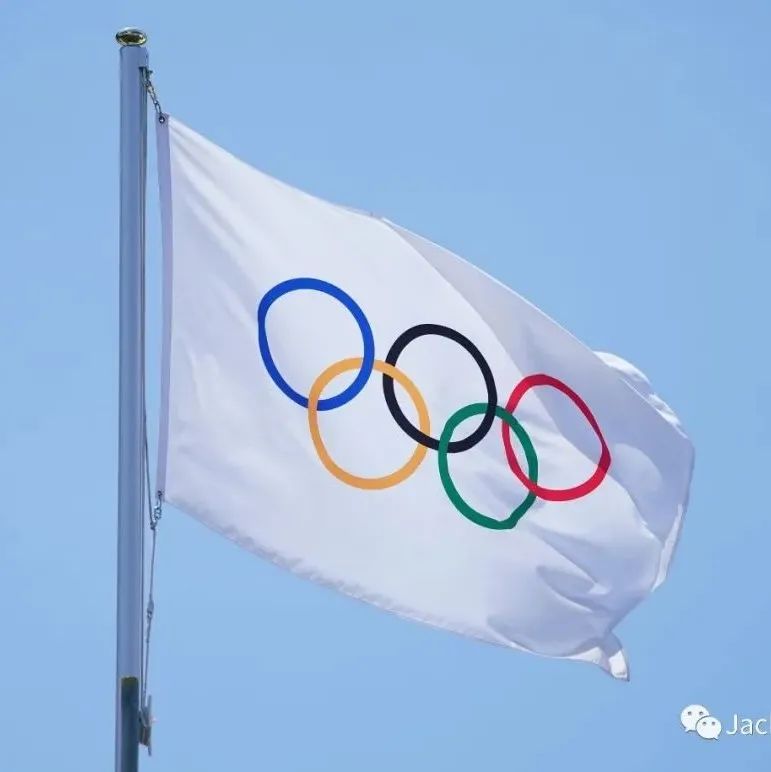Links Between East and West 15 Politics in the Olympics 奥林匹克中的政治
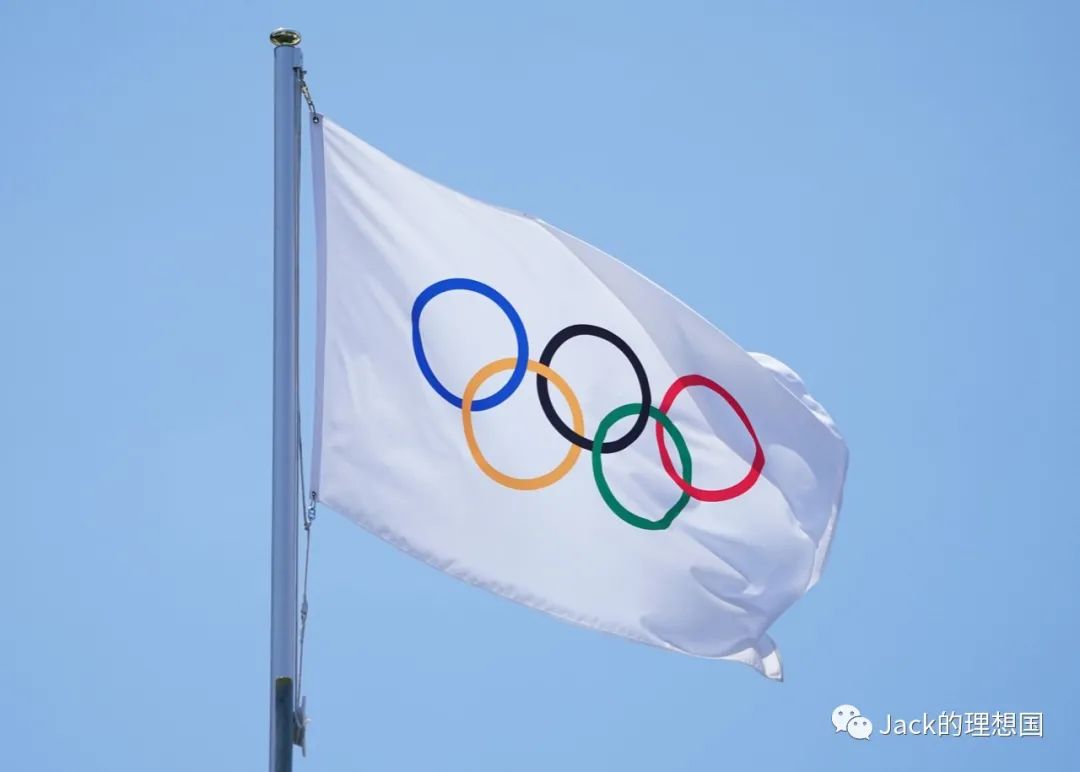
During the Beijing Winter Olympics, many were not just spectating the athletes. Many were also spectating the politics involved in this Olympics and were commentating about the demonstration of soft power or the indirect confrontations between the superpowers. Whether the summer or the winter ones, the Olympics have hardly been deprived of politics. This essay will first reason why politics have always been involved in these Games, then enumerate several Games in history where politics took center stage, and finally express general opinions on this phenomenon.
People are born to be political. Politicians would always use the Olympics to reach personal or national goals whenever the opportunity comes. One reason why the Olympics became politicized is that nations often attempt to demonstrate soft power through the accomplishment of their athletes. Soft power is essentially about "shaping the preferences of others through appeal and attraction." The currency of soft power is usually culture or political and social values. During the Olympics, superpowers, in particular, could utilize the medal table to showcase that their social or political order is better than that of others. If we could win more medals than you, then it is at least partially because our country has a more effective system of training athletes and also has more public support for this system or the government in general. In other cases, the host country might want to demonstrate its policies or systems of government through the Games. The Olympics have never been devoid of such flexing of political muscle to gain advantages on the international stage.
Moreover, the Olympics usually get politicized because countries with internal or external issues use the Games as a platform to divert away attention, achieving some political purpose. For example, Britain handled the virus exceptionally poorly. Its government could thus, to some extent, distract the public and the politicians' focus on the pandemic by emphasizing the 2021 Tokyo Olympics more. Through this diversion of public and political attention, Britain added some color of politics into that Olympics.
Finally, athletes can express their political stances or views through the Olympics. Since the Olympics is the grandest sports event ever held, it would serve as a great platform to voice opinions on political matters. Protests have been common during the Olympics even though the International Olympics Committee ("IOC") has tried to limit them. As a result, it is hard to eradicate politics out of the Games altogether.
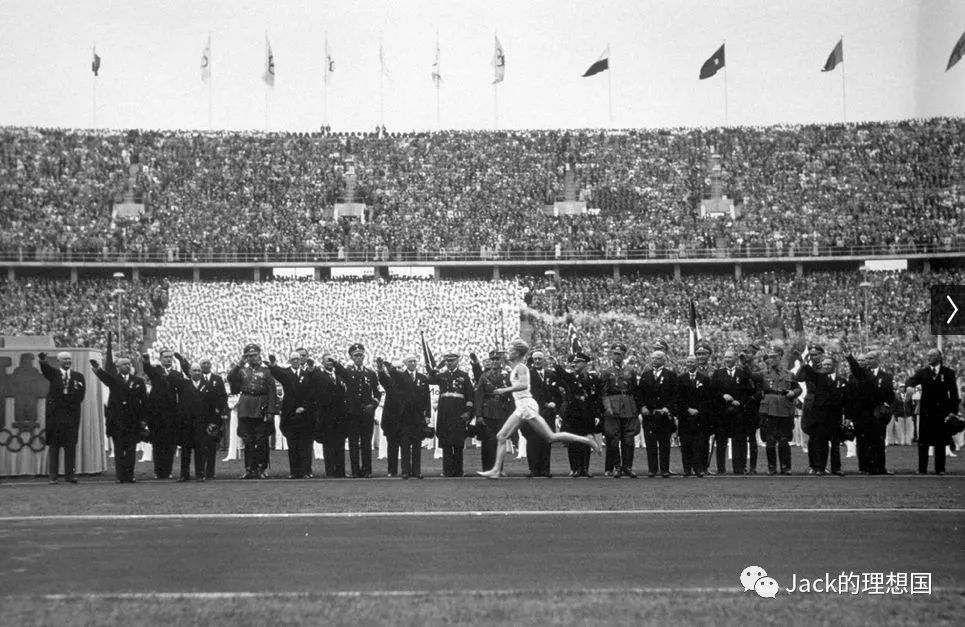
(A photo of the 1936 Berlin Games)
There were numerous cases when the Olympics were filled with the scent of politics in the past. In the 1936 Berlin Olympics, Hitler's regime mixed the Games with politics in an obvious way by only allowing an "all-Aryan" German team to participate, demonstrating its political policies against the "non-Aryans."
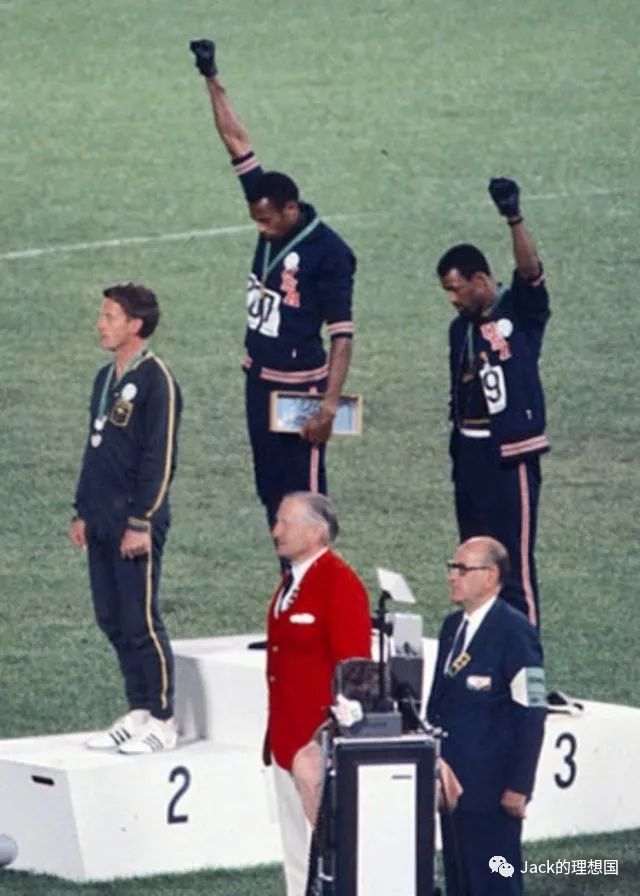
(Tommie Smith and John Carlos protesting on the podium)
The 1968 New Mexico Olympics was arguably one of the most politicized games ever. Racial issues in America and the politics related were the most highlighted topics. On October 16th, African American sprinters Tommie Smith and John Carlos, the gold and bronze winners of the event, directly brought politics in. On the podium, they were wearing human rights badges and raised a black-gloved fist when the national anthem of the U.S., Star-Spangled Banner, was played as signs of protest against the racial policies of the U.S. government. Although the athletes later received serious punishment, politics did not leave the Olympics.
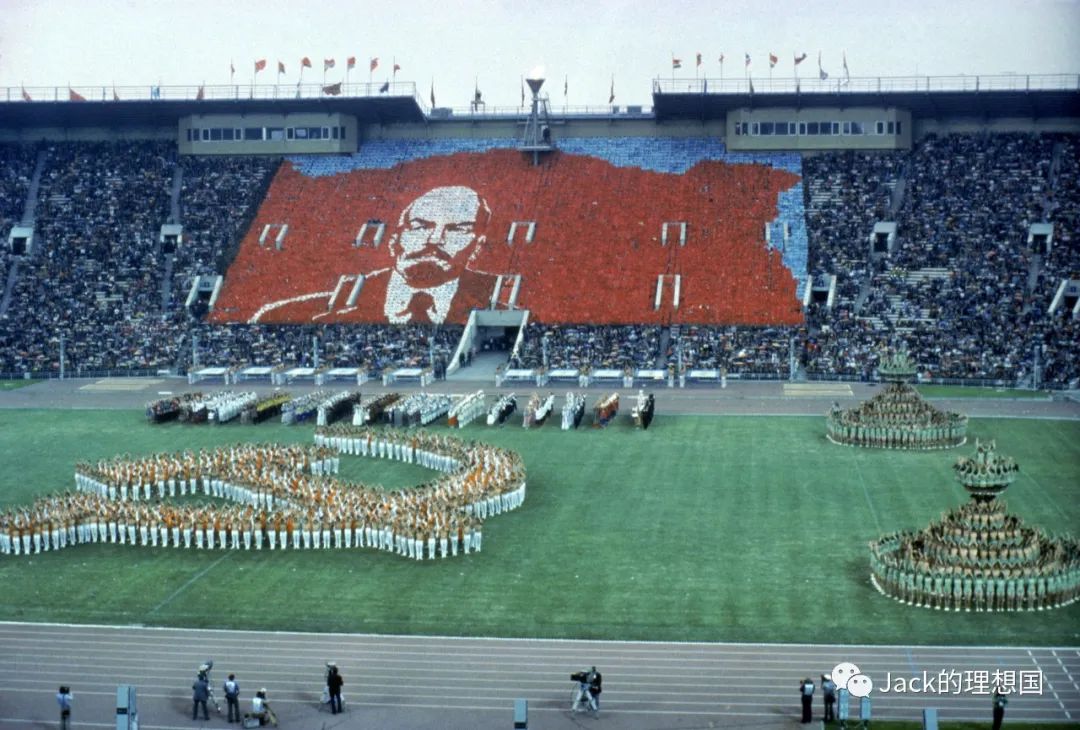
(A photo of the Moscow Games, 1980)
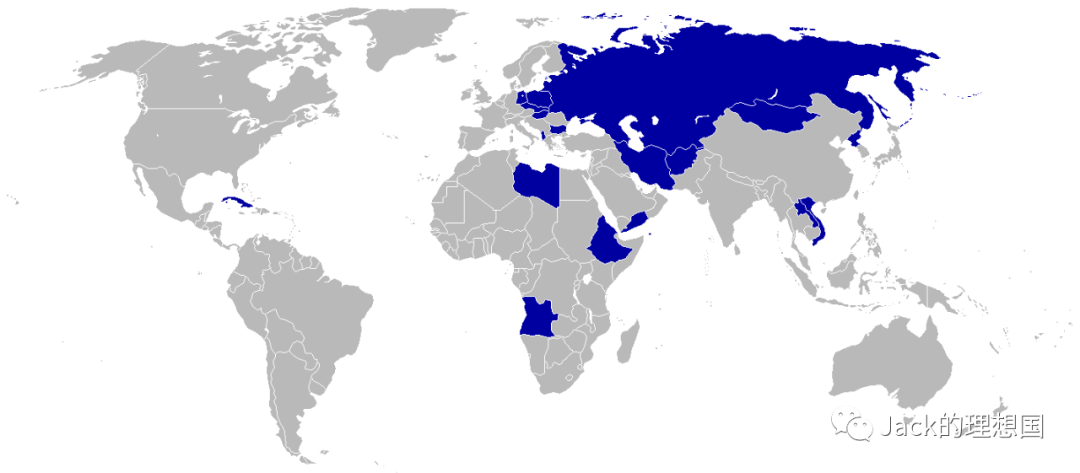
(A map showing in blue the countries that boycotted the 1984 Los Angeles Games)
Another rather extreme case of the Olympics' politicization was the 1980 and 1984 Games in Moscow and Los Angeles, respectively. In the 1980 Moscow Games, America and 64 other countries boycotted or refused to attend. In 1980, the Soviet Union launched its war in Afghanistan, and western powers decided to show their firm political stance against the Soviet invasion by refusing to send athletes. The 1980 Games are a perfect example of how political the Olympics could become. Retaliation soon came to America and its allies. Shortly before the 1984 Los Angeles Games, the Soviet Union and 13 other Eastern Bloc countries boycotted that Olympics. In both cases, the IOC could not realistically stop the U.S. and the Soviet Union from raising their political rivalry onto the stage of the Olympics.

In the 2022 Beijing Olympics, political commentaries shrouded the Games. The Economist, one of the leading academic magazines in the western hemisphere, openly wrote in one of its articles that the Winter Olympics symbolized a world divided and a world in which China would lead and dominate. Other western journals and magazines produced similar commentaries. There were also discussions about many politically sensitive topics in China. Even the athletes themselves became tools that some news agencies or politicians wield. For example, the skier Eileen Gu was drawn into debates about nationality and nationalism, and people used the comments from other athletes about the extraordinary conditions of this Olympics to stir up national pride. From these examples, it is clear that the Olympics could not escape the field of politics.
From my point of view, the Olympics filled with politics is not a positive phenomenon. The Olympics, by rule, should not involve politics, and thus any attempt to bring politics in is inappropriate. The Olympics are centered around two principles. First, it is a gathering of the top athletes worldwide to compete and mutually respect each other. Second, it symbolizes a sacred moment when we, humanity as a whole, can appreciate our diversities and come together to create a greater unity based on such diversities. It is an inspiration for all leaders to solve problems based on friendship and solidarity, not to confront each other acrimoniously. The Olympics is not a tool to express a political opinion; it should not be regarded as the right platform to comment on nations' divisions and political matters. The Games should be politically neutral, and efforts to force domestic politics or international political relations on top of this sports convention violate the two fundamental principles themselves, creating only more severe gaps as well as greater disunity.
Commenting about or meddling with politics and international relations through sports does not affect solving problems for any side. For example, the political protests during the New Mexico Olympics did not seriously solve racial issues in the U.S. It is, in fact, still one of the deadly tumors of American society; the political boycotts of the 1980 Moscow Olympics did not stop the Soviets from invading Afghanistan. Instead, the war dragged on for another nine years; the political boycotts of the 1984 Los Angeles Olympics, similarly, did not reach any helpful political end. The Cold War persisted for another seven years until the collapse of the Soviet Union in 1991. The political confrontation by utilizing the 2022 Beijing Olympics will not lead the west or China anywhere either.
Overall, politics have always been involved in the sacred event of the Olympics. Although the IOC and other international NGOs passed regulations to block politics from the Games, political talk always persisted. It is disheartening to a degree when I see politics or political bickering in any Olympics, including the one in 2022. In the status quo, unity, diversity, and mutual respect are, above all, needed. World leaders and athletes should treat the Olympics as one of the last opportunities for global countries to communicate or appreciate each other. Yet unfortunately, the globe has not been treating the Olympics this way. Tensions continue to build during the 2022 Games between China and the west, and most horrifically, in Ukraine. It is time for the world to wake up and bring the Olympic values back onto the table. Otherwise, our dreams of a peaceful, diverse globe could not come into realistic terms, and we could only expect further volatility and widespread conflict in the near future.
PICTURES CITED
https://en.wikipedia.org/wiki/1968_Summer_Olympics#Boycotting_countries
https://en.wikipedia.org/wiki/1980_Summer_Olympics_boycott
https://en.wikipedia.org/wiki/1984_Summer_Olympics_boycott
nationalgeographic.com/history/article/brutal-story-1936-popular-olympics-boycott-fascism-hitler
https://time.com/6145687/winter-olympics-athletes-us-china-gu-politics/

在北京冬奥会期间,许多人不仅仅是在观看运动员的比赛,他们还在观察本届奥运会所涉及的政治,并对软实力的展示或超级大国之间的间接对抗进行评论。奥运会,无论是夏季奥运会还是冬季奥运会,几乎都没有缺少过政治。本文将首先解释为什么政治总是参与到奥运会中,然后列举历史上政治成为中心舞台的几届奥运会,最后表达对这一现象的一般看法。
人生来就是政治动物。只要有机会,政治家们总是会利用奥运会来达到一些个人或国家的目标。奥运会变得政治化的一个合理原因是,国家往往试图通过其运动员的成就来展示软实力。软实力本质上是 "通过文化或政治吸引力来塑造他国对本国的偏好"。软实力的体现通常在文化、政治和社会价值观方面。在奥运会期间,超级大国尤其可以利用奖牌榜来展示他们的社会或政治秩序优于其他国家。如果我们能比你们赢得更多的奖牌,那么至少有一部分原因是我们国家拥有更有效的运动员培训体系,同时也有更多的公众对这个体系或政府大力支持。在其他情况下,主办国可能只是想通过奥运会展示其政策或政府系统的运转方式。奥运会从来都不乏这种为了在国际舞台上获得优势而施展政治力量与展示软实力的行为。
此外,奥运会通常会被政治化,因为有内部或外部问题的国家将奥运会作为一个平台来转移注意力,达到一些政治目的。例如,英国对新冠的处理非常糟糕。因此,其政府在某种程度上可以通过更多强调2021年东京夏季奥运会上英国运动员的表现来转移公众和政治家对疫情的关注。通过这种对公众和政治注意力的转移,英国往那届奥运会中注入了一些政治色彩。
最后,运动员可以通过奥运会表达他们的政治立场或观点。由于奥运会是有史以来最盛大的体育赛事,它将成为一个对政治事务发表意见的绝佳平台。尽管国际奥委会("IOC")试图限制抗议活动,但在奥运会期间,抗议活动还是很常见。要完全消除奥运会中的政治因素是很困难的。

(1936年柏林奥运会照片)
在过去,有无数的案例表明,奥运会充满了政治的气息。在1936年的柏林奥运会上,希特勒政权以明显的方式将奥运会与政治混为一谈,只允许一支 "全雅利安人 "的德国队参赛,显示了其反对 "非雅利安人 "的政治政策。

(托米-史密斯和约翰-卡洛斯在领奖台上进行抗议)
1968年的美国新墨西哥州奥运会可以说是有史以来最政治化的运动会之一。美国的种族问题和相关政治是最突出的话题。1968年10月16日,非裔美国短跑运动员托米-史密斯和约翰-卡洛斯,即该赛事的金牌和铜牌得主,直接将政治带入其中。在领奖台上,他们戴着人权徽章,当美国国歌《星条旗》响起时,他们举起带黑手套的拳头,作为抗议美国政府种族政策的标志。尽管这些运动员后来受到了严重的惩罚,但政治因素并没有离开奥运会。

(1980年莫斯科奥运会图片)

(1984年抵制洛杉矶奥运会的国家标为蓝色)
奥运会政治化的另一个相当极端的案例是1980年和1984年分别在莫斯科和洛杉矶举行的奥运会。在1980年的莫斯科奥运会上,美国和其他64个国家抵制或拒绝参加。1980年,苏联在阿富汗发动战争,西方诸国决定通过拒绝派遣运动员来表明他们反对苏联入侵的坚定政治立场。1980年的奥运会是一个完美的例子,说明了奥运会可以变得多么政治化与冲突化。美国及其盟友很快就遭到了报复。1984年洛杉矶奥运会前不久,苏联和其他13个东欧国家抵制了这次奥运会。在这两次情况下,国际奥委会无法现实地阻止美国和苏联将其政治竞争上升到奥运会的舞台上。
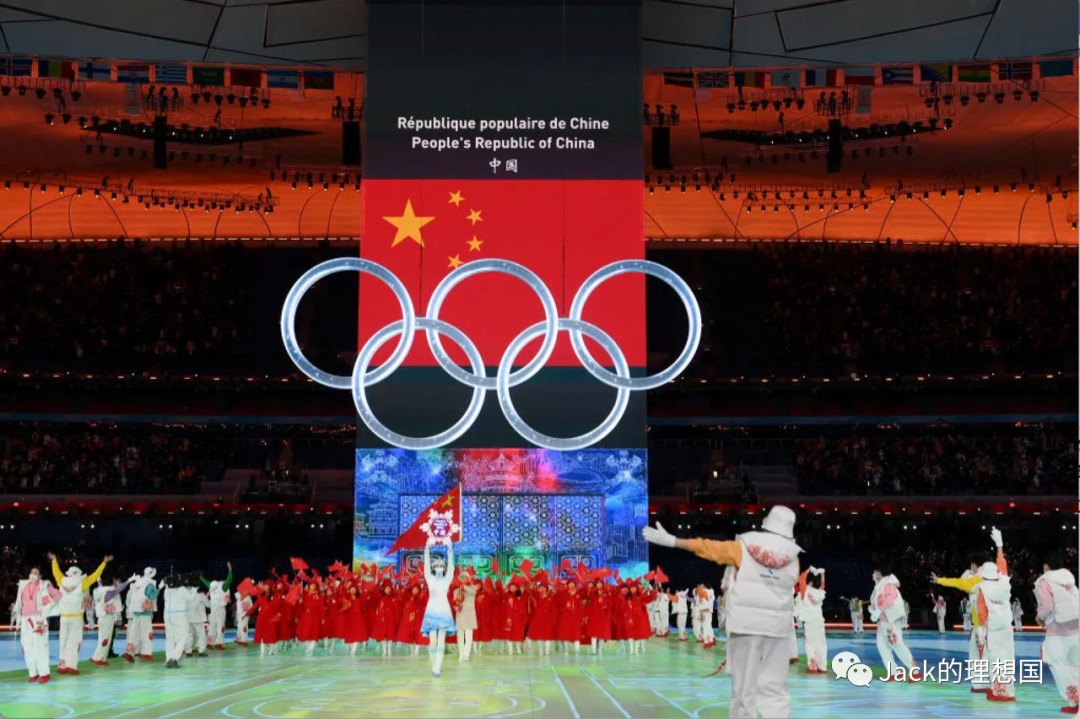
在2022年北京奥运会上,政治评论笼罩了整个奥运会。西半球领先的学术杂志之一《经济学人》在其一篇文章中公开写道,冬奥会象征着一个分裂的世界,一个中国将领导和主导的世界。其他西方期刊和杂志也发表了类似的评论文章。在中国,也有关于许多政治敏感话题的讨论,甚至运动员本身也成为一些新闻机构或政治家挥舞的工具之一。例如,滑雪运动员谷爱凌被卷入了关于国籍和民族主义的辩论中,其他运动员关于本届冬奥会绝佳场地与住所的评论被用来挑起民族自豪感。从这些例子可以看出,奥运会无法逃脱政治领域的影响。
在我看来,充满政治的奥运会并不是一个积极的现象。按照规定,奥运会不应涉及政治,因此,任何将政治带入的企图都是不合适的。奥运会是以两个原则为中心的。首先,它是全世界顶级运动员的聚会,他们相互竞争,相互尊重。第二,它象征着一个神圣的时刻,我们人类作为一个整体,可以欣赏我们的多样性,并走到一起,在这种多样性的基础上创造一个更大的团结。它激励着所有领导人在友谊和团结的基础上解决问题,而不是尖锐地对抗对方。奥运会不是表达政治观点的工具,它不应该被视为评论各方之间的分歧和政治问题的正确平台。奥运会应该是政治中立的,把国内政治或国际政治关系强加在这个体育公约之上的努力违反了这两个基本原则本身,只会造成更严重的差距以及更大的不团结。
通过体育来评论或干涉政治和国际关系,对解决任何一方的问题都没有任何效果。新墨西哥州奥运会期间的政治抗议并没有根本解决美国的种族问题。事实上,它仍然是美国社会的致命毒瘤之一;1980年莫斯科奥运会的政治抵制并没有阻止苏联入侵阿富汗。事实上,战争又拖了九年的时间;同样,对1984年洛杉矶奥运会的政治抵制也没有达到任何有益的政治目的,冷战又持续了7年,直到1991年苏联解体;利用2022年北京奥运会进行政治对抗,也不会使西方或中国分别满足政治目标。
总的来说,政治一直参与到奥运会这一神圣的活动中。尽管国际奥委会和其他国际非政府组织通过规定,将政治阻挡在奥运会之外,但政治话题始终存在。当我在任何一届奥运会上看到政治或政治争吵,包括2022年的奥运会,我在某种程度上感到沮丧。在现实的世界中,团结、多样性和相互尊重是最需要的。世界领导人和运动员应该把奥运会当作全球各国相互沟通或相互欣赏的最后机会之一。然而不幸的是,全球并没有这样对待奥运会。在2022年奥运会期间,中国和西方国家之间的紧张局势继续扩大,最令人担心的乌克兰问题也快速发酵。现在是世界觉醒的时候了,需把奥林匹克精神重新唤醒,否则,我们对一个和平、多样化的全球的梦想就不可能实现,等待我们的将是进一步的动荡和广泛的冲突。
- 本文标签: 原创
- 本文链接: http://www.jack-utopia.cn//article/411
- 版权声明: 本文由Jack原创发布,转载请遵循《署名-非商业性使用-相同方式共享 4.0 国际 (CC BY-NC-SA 4.0)》许可协议授权
